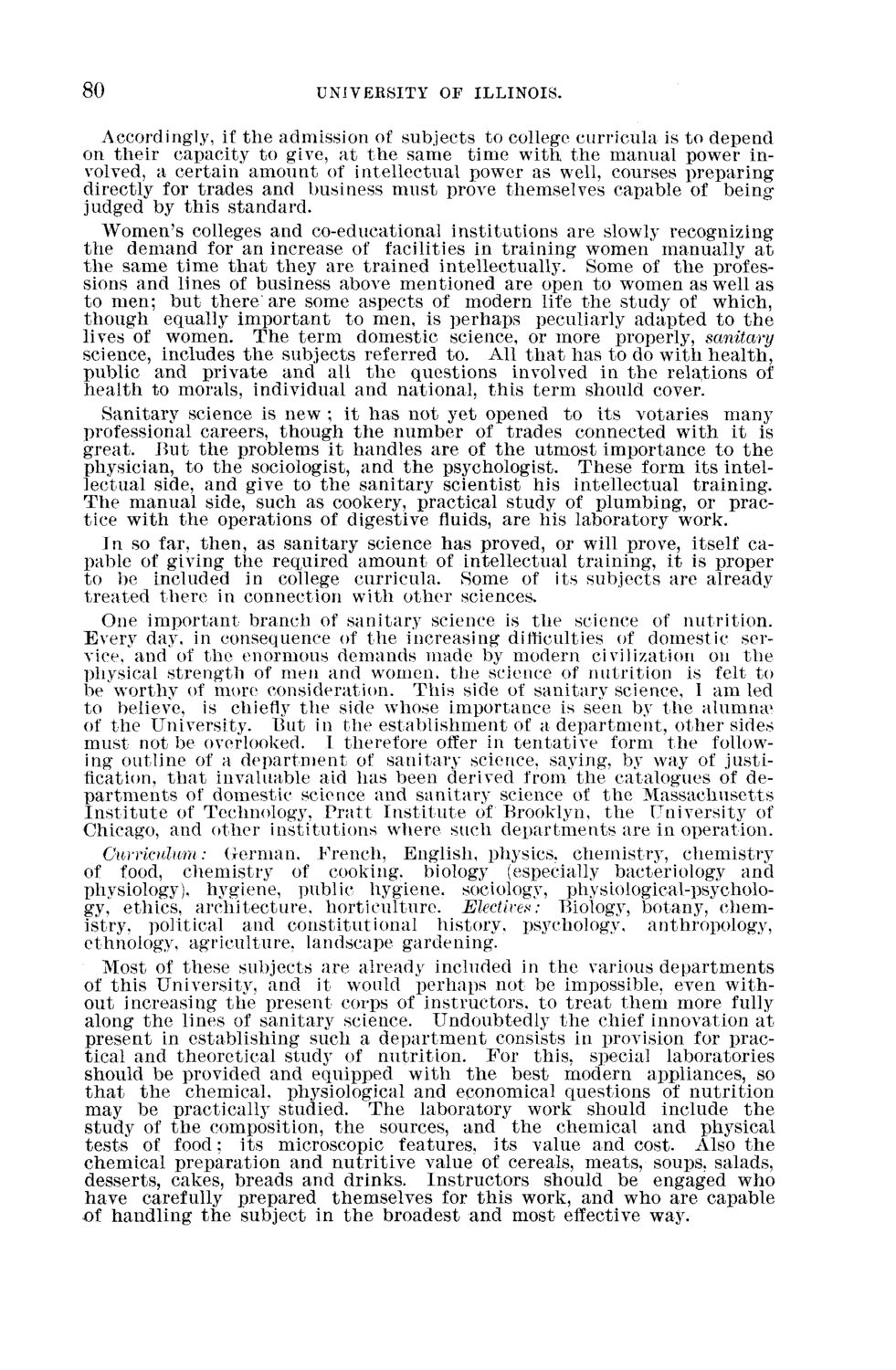| |
| |
Caption: Board of Trustees Minutes - 1894
This is a reduced-resolution page image for fast online browsing.

EXTRACTED TEXT FROM PAGE:
80 UNIVERSITY OF ILLINOIS. Accordingly, if the admission of subjects to college curricula is to depend on their capacity to give, at t h e same time with the manual power involved, a certain amount of intellectual power as well, courses preparing directly for trades and business must prove themselves capable of being judged by this standard. Women's colleges and co-educational institutions are slowly recognizing the demand for an increase of facilities in training women manually at the same time t h a t they are trained intellectually. Some of the professions and lines of business above mentioned are open to women as well as to men; but there are some aspects of modern life the study of which, though equally important to men, is perhaps peculiarly adapted to the lives of women. The term domestic science, or more properly, sanitary science, includes the subjects referred to. All t h a t has to do with health, public and private and all the questions involved in the relations of health to morals, individual and national, this term should cover. Sanitary science is new ; it has not yet opened to its votaries many professional careers, though the number of trades connected with it is great. But the problems it handles are of the utmost importance to t h e physician, to the sociologist, and the psychologist. These form its intellectual side, and give to the sanitary scientist his intellectual training. The manual side, such as cookery, practical study of plumbing, or practice with the operations of digestive fluids, are his laboratory work. In so far, then, as sanitary science has proved, or will prove, itself capable of giving the required amount of intellectual training, it is proper to be included in college curricula. Some of its subjects are already treated there in connection with other sciences. One important branch of sanitary science is the science of nutrition. Every day, in consequence of the increasing difficulties of domestic service, and of the enormous demands made by modern civilization on the physical strength of men and women, the science of nutrition is felt to be worthy of more consideration. This side of sanitary science, I am led to believe, is chiefly the side whose importance is seen by the alumna? of the University. But in the establishment of a department, other sides must not be overlooked. I therefore offer in tentative form the following outline of a department of sanitary science, saying, by way of justification, t h a t invaluable aid has been derived from the catalogues of departments of domestic science and sanitary science of the Massachusetts I n s t i t u t e of Technology, Pratt Institute of Brooklyn, the University of Chicago, and other institutions where such departments are in operation. Curriculum: German, French, English, physics, chemistry, chemistry of food, chemistry of cooking, biology (especially bacteriology and physiology), hygiene, public hygiene, sociology, physiological-psychology, ethics, architecture, horticulture. Elective*: Biology, botany, chemistry, political and constitutional history, psychology, anthropology, ethnology, agriculture, landscape gardening. Most of these subjects are already included in the various departments of this University, and it would perhaps not be impossible, even without increasing the present corps of instructors, to treat them more fully along the lines of sanitary science. Undoubtedly the chief innovation at present in establishing such a department consists in provision for practical and theoretical study of nutrition. For this, special laboratories should be provided and equipped with the best modern appliances, so t h a t the chemical, physiological and economical questions of nutrition may be practically studied. The laboratory work should include t h e study of the composition, the sources, and the chemical and physical tests of food; its microscopic features, its value and cost. Also the chemical preparation and nutritive value of cereals, meats, soups, salads, desserts, cakes, breads and drinks. Instructors should be engaged who have carefully prepared themselves for this work, and who are capable of handling the subject in the broadest and most effective way.
| |